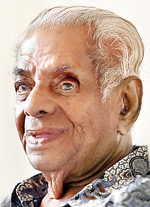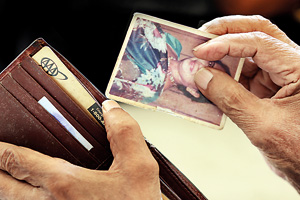There’s a time for everything, even at 99
The birthday is tomorrow but the grand celebrations are today. Surrounded by family and friends, Don Edwin De Silva will blow out the candles, before cutting the cake. It will indeed be an onerous task, for Mr. De Silva will have to blow out 100 candles, in preparation for being on the threshold of the second century, having lived a happy and fruitful first century.

Champion athlete at Ananda College: Don Edwin De Silva (extreme right)
His handshake is firm, as this sprightly centenarian greets us on Wednesday just before we sit down for a long chat with him at a friend’s third-floor apartment down Hill Street in Dehiwela.There is no elevator and the Sunday Times team is a little out of breath after climbing the stairs, but there is no such discomfort for Mr. De Silva. Having arrived in a trishaw from his home off Veluwana Road, Colombo 5, he has climbed the stairs without help and is all smiles.
We joke about him gaining the milestone of a hundred, as he laughingly says “not yet, in a few days time”. Yes, it is on June 8 that this Grand Old Man will step into his 100th year. When he pulls out an American driving licence to show us his date of birth which is June 8, 1916, a debate ensues. We argue that he is 99, but Mr. De Silva is firm. “I am stepping into my 100th year,” he says, brooking no more disagreement.
Then we meander down memory lane, crystal clear thoughts of the past being recounted without hesitancy. Originally the family of seven, father (a businessman), mother, elder sister, Edwin and three younger brothers lived in Kurunegala. His early education was at Maliyadeva College, followed by Ananda College, Colombo, excelling in sports and concluding with the matriculation.

Pictures from the past: On his wedding day
“Next I tried to get into a job,” says Mr. De Silva, reminiscing how he joined the Colombo Municipal Council (CMC) as a Public Health Inspector (PHI), winning two scholarships to Britain and Japan. “I travelled all over and also attended the Queen’s birthday party held in the beautiful garden of Buckingham Palace after having won a ticket in a lot-draw for the limited invites.”
Having become friends with a Sri Lankan family, Mr. De Silva had also had the privilege of joining them for a tour of Europe.
Back home in Sri Lanka, he recalls how during one election when Ranasinghe Premadasa (who would later become President) was the Junior Minister of Local Government, Mr. De Silva took up duties as his Private Secretary. “Various difficulties arose due to politics and I quit,” he says, adding in no uncertain terms that he does not want to talk about it.
Memories are still fresh of the time when he was supervising the distribution of meat on coupon at the Wellawatte market. Seeing a man being around for two hours in the queue and asking him why Mr. De Silva had found that he was a golaya of the then Head of Medical Services, Dr. Williams.
Having arranged to overcome the red tape and sending the man off with the family’s requirements, he had later been contacted by Mrs. Williams, forging close links with the family. This had led to him teaching Sinhala not only to the Williams children but subsequently to another family which was friends with them.

The grand old centenarian: Living a simple and frugal life now
“It was to Maha Nuga Gardens in Kollupitiya that I rode my bicycle to teach two children,” he says, one of whom was none other than Felix Dias Bandaranaike who would become one of the most powerful politicians of that era. “Very sharp,” is how he describes Felix who attempted to go ahead with his Sinhala tuition in a manner different to what was set by the tutor. His tutor, however, insisted that he follow the plan of teaching laid down by him.
By now Mr. De Silva was married to Nanda, with whom he had fallen in love while still at Ananda College. For, she was at Ananda Balika and had been at a function at Ananda College with some other girls, with young Edwin having to serve cake to her.
When his father checked whether their horoscopes matched, the astrologer who had pored over them had been surprised, telling him that all indications pointed to the couple having been husband and wife in their previous births as well.
An active member of the Old Boys’ Union (OBU) of Ananda College, he reminisces how as Secretary he saved the school from debt. When the OBU was told that the Ananda premises were under mortgage, he had come up with the suggestion of holding a carnival during the month of the school vacation.
“It was a huge success bringing in a princely sum of Rs. 95,000 with which the mortgage was redeemed from the Buddhist Theosophical Society in Adyar, Madras,” says this ‘oldest’ Anandian.
Much later, on retirement at 55 from his work as a PHI, Mr. De Silva, his wife and daughters Nirmala and Surangani, headed for the United States of America, settling in St. Louis, Missouri. There he had found himself a job in the health sector, handling the swine flu campaign with aplomb which propelled him to the post of Assistant Director even without applying for the job.

Memories are made of these: Don Edwin De Silva pulls out a photograph of his late wife Nanda from his wallet. Pix by M.A. Pushpa Kumara
He recalls the words of wisdom of one of his teachers, Mr. Wijemanne, which were the “winning factor” in his successful career – Whatever you do, be there five minutes early and leave five minutes after your job is done. “I do this even today,” he smiles.
Returning home to Sri Lanka about two years after the death of his beloved Nanda, Mr. De Silva’s routine revolves around leading a simple and frugal life.
Explaining that he does not owe a cent to anyone, he is quick to point out that he doesn’t borrow but lives within his means. This is a practice inculcated by his mother when he was a little boy, by gifting him with a small kete (till) in which he saved whatever he got from his elders to be used sparingly.
There is a time for everything, says Mr. De Silva, giving his daily routine as waking up at 6.30 in the morning, having his bath at 7, followed by breakfast consisting of a bowl of cereal with a small banana cut over it and a touch of kitul treacle along with a cup of marmite.
Thereafter, he reads the newspapers and watches a little television to keep abreast of the news, with a cup of tea at 10.30 and lunch at 12.30 consisting of a single ladle of rice, a piece of fish and large portions of vegetables and mallun, followed by a slice of papaya or a scoop of ice cream.
He digresses to explain how he stopped eating meat after seeing a line of cattle with tears in their eyes being sent to slaughter in a foreign country. Neither does he smoke. Next it’s shut-eye for a little while in his chair not in bed, a cup of tea at 3 and rain or shine, a brisk walk, with a cup of barley kept ready for his return. Dinner would be anything that is on the table such as four string hoppers and curry.
A “must” is the Maithri Bhavana at 9 p.m. after which Mr. De Silva says he has no trouble falling asleep. Getting back to his birthday celebrations, while his daughters have arranged a party for him, Mr. De Silva has already paid for a meal to be given to the Mallika Home for the Elderly. His personal ‘gift’ to the 80 women there would be a small bag with a perfumed cake of sandalwood soap, a card of paracetamol and a small bottle of Siddhalepa each.
Yes, he has lots of friends and he meets up with two groups of senior citizens twice a week to play chess, carrom and chat.
Laughingly he adds that he has already paid an undertaker for his funeral arrangements. His fervent wish for the future though is that he will not be bed-ridden but able to lead a normal life until his death. As he shows the double life-lines on his palm, we bid him goodbye, wishing him a healthy and happy future.


